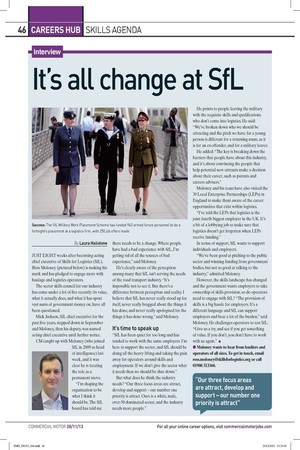It's all change at SfL
Page 37

If you've noticed an error in this article please click here to report it so we can fix it.
By Laura Hailstone
JUST EIGHT weeks after becoming acting chief executive of Skills for Logistics (Sit), Ross Moloney (pictured below) is making his mark and has pledged to engage more with haulage and logistics operators.
The sector skills council for our industry has come under a lot of fire recently: its value, what it actually does, and what it has spent vast sums of government money on, have all been questioned.
Mick Jackson, Sit chief executive for the past five years, stepped down in September and Moloney, then his deputy, was named acting chief executive until further notice. CM caught up with Moloney (who joined
SfL in 2009 as head of intelligence) last week, and it was clear he is treating the role as a permanent move. "I'm shaping the organisation to be what I think it should be. The Sit board has told me
there needs to be a change. Where people have had a bad experience with SfL, I'm getting rid of all the sources of bad experience," said Moloney.
He's clearly aware of the perception among many that Sit isn't serving the needs of the road transport industry. "It's impossible not to see it. But there's a difference between perception and reality. I believe that SfL has never really stood up for itself, never really bragged about the things it has done, and never really apologised for the things it has done wrong," said Moloney. It's time to speak up
"SfL has been quiet for too long and has tended to work with the same employers. I'm here to support the sector, and SfL should be doing all the heavy lifting and taking the pain away for operators around skills and employment. If we don't give the sector what it needs then we should be shut down."
But what does he think the industry needs? "Our three focus areas are attract, develop and support — our number one priority is attract. Ours is a white, male, over-50 dominated sector, and the industry needs more people."
He points to people leaving the military with the requisite skills and qualifications who don't come into logistics. He said: "We've broken down who we should be attracting and the pitch we have for a young person is different for a returning mum, as it is for an ex-offender, and for a military leaver.
He added: "The key is breaking down the barriers that people have about this industry, and it's about convincing the people that help potential new entrants make a decision about their career, such as parents and careers advisers."
Moloney and his team have also visited the 39 Local Enterprise Partnerships (LEPs) in England to make them aware of the career opportunities that exist within logistics.
"I've told the LEPs that logistics is the joint fourth biggest employer in the UK. It's a bit of a lobbying job to make sure that logistics doesn't get forgotten when LEPs receive funding."
In terms of support, Sit wants to support individuals and employers.
"We've been good at pitching to the public sector and winning funding from government bodies, but not so good at talking to the industry," admitted Moloney. However, the skills landscape has changed and the government wants employers to take ownership of skills provision, so do operators need to engage with SfL? "The provision of skills is a big hassle for employers. It's a different language and SfL can support employers and bear a lot of the burden," said Moloney. He challenges operators to test SfL. "Give us a try, and see if you get something of value. If you don't, you don't have to work with us again." •
• Moloney wants to hear from hauliers and operators of all sizes. To get in touch, email ross.moloney@skillsforlogistics.org or call 01908 313360.







































